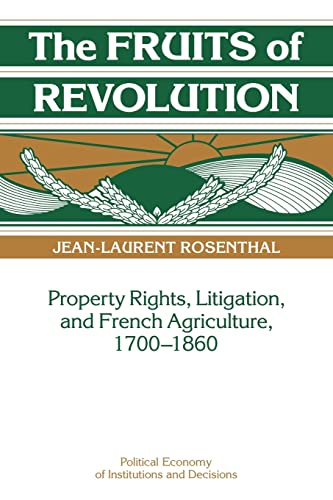The Fruits of Revolution: Property Rights, Litigation and French Agriculture, 1700–1860 (Political Economy of Institutions and Decisions) - Softcover

Inhaltsangabe
The Fruits of Revolution examines the impact of revolution on French agricultural development.
Die Inhaltsangabe kann sich auf eine andere Ausgabe dieses Titels beziehen.
Über die Autorin bzw. den Autor
Charlotte y Peter Fiell son dos autoridades en historia, teoría y crítica del diseño y han escrito más de sesenta libros sobre la materia, muchos de los cuales se han convertido en éxitos de ventas. También han impartido conferencias y cursos como profesores invitados, han comisariado exposiciones y asesorado a fabricantes, museos, salas de subastas y grandes coleccionistas privados de todo el mundo. Los Fiell han escrito numerosos libros para TASCHEN, entre los que se incluyen 1000 Chairs, Diseño del siglo XX, El diseño industrial de la A a la Z, Scandinavian Design y Diseño del siglo XXI.
Von der hinteren Coverseite
In The Fruits of Revolution Jean-Laurent Rosenthal investigates two central questions in French economic history: To what extent did institutions hold back agricultural development under the Old Regime, and did reforms carried out during the French Revolution significantly improve the structure of property rights in agriculture? Both questions have been the subject of much debate. Historians have touched on them in a number of local studies, yet usually they have been more concerned with community conflict than with economic development. Economists generally have researched the performance of the French economy without paying much attention to the impact of institutions on specific areas of the economy. This book attempts to utilize the best of both approaches: It focuses on broad questions of economic change, yet it is based on detailed archival investigations of the impact of property rights on water control. Part I provides both an introduction to French economic history between 1700 and 1860 and an introduction to the economic literature on property rights and institutions. Part II first looks at water control from a national perspective and then examines two case studies, one of drainage in Normandy and one of irrigation in Provence. The national evidence shows that most water control efforts failed before 1789, whereas 1820-60 were boom years for irrigation and drainage. Quantitative and qualitative evidence suggests that neither technology nor relative prices were responsible for the failure to develop agriculture under the Old Regime; rather, ambiguous property rights, divided authority, and endless litigation all conspired to reduce the efficacy of water control. The Revolutionsolved important institutional problems for the countryside by centralizing authority over eminent domain, reforming the judiciary, and clarifying property rights to land water. As a result, after 1820 water control flourished. Part III of the book is devoted to explaining why inefficient property rights arose in the Middle Ages and prevailed until 1789. A set of theoretical models is analyzed to argue that ill-defined property rights were part of the very structure of the Old Regime--a fact that made reform impossible without a revolution.
„Über diesen Titel“ kann sich auf eine andere Ausgabe dieses Titels beziehen.
Weitere beliebte Ausgaben desselben Titels
Suchergebnisse für The Fruits of Revolution: Property Rights, Litigation...
The Fruits of Revolution : Property Rights, Litigation and French Agriculture, 1700 1860
Anbieter: AHA-BUCH GmbH, Einbeck, Deutschland
Taschenbuch. Zustand: Neu. Druck auf Anfrage Neuware - Printed after ordering - In The Fruits of Revolution Jean-Laurent Rosenthal investigates two central questions in French economic history: To what extent did institutions hold back agricultural development under the Old Regime, and did reforms carried out during the French Revolution significantly improve the structure of property rights in agriculture Both questions have been the subject of much debate. Historians have touched on them in a number of local studies, yet usually they have been more concerned with community conflict than with economic development. Economists generally have researched the performance of the French economy without paying much attention to the impact of institutions on specific areas of the economy. This book attempts to utilize the best of both approaches: It focuses on broad questions of economic change, yet it is based on detailed archival investigations of the impact of property rights on water control. Part I provides both an introduction to French economic history between 1700 and 1860 and an introduction to the economic literature on property rights and institutions. Part II first looks at water control from a national perspective and then examines two case studies, one of drainage in Normandy and one of irrigation in Provence. The national evidence shows that most water control efforts failed before 1789, whereas 1820-60 were boom years for irrigation and drainage. Quantitative and qualitative evidence suggests that neither technology nor relative prices were responsible for the failure to develop agriculture under the Old Regime; rather, ambiguous property rights, divided authority, and endless litigation all conspired to reduce the efficacy of water control. The Revolutionsolved important institutional problems for the countryside by centralizing authority over eminent domain, reforming the judiciary, and clarifying property rights to land water. As a result, after 1820 water control flourished. Part III of the book is devoted to explaining why inefficient property rights arose in the Middle Ages and prevailed until 1789. A set of theoretical models is analyzed to argue that ill-defined property rights were part of the very structure of the Old Regime--a fact that made reform impossible without a revolution. Artikel-Nr. 9780521103121
Neu kaufen
Anzahl: 1 verfügbar

